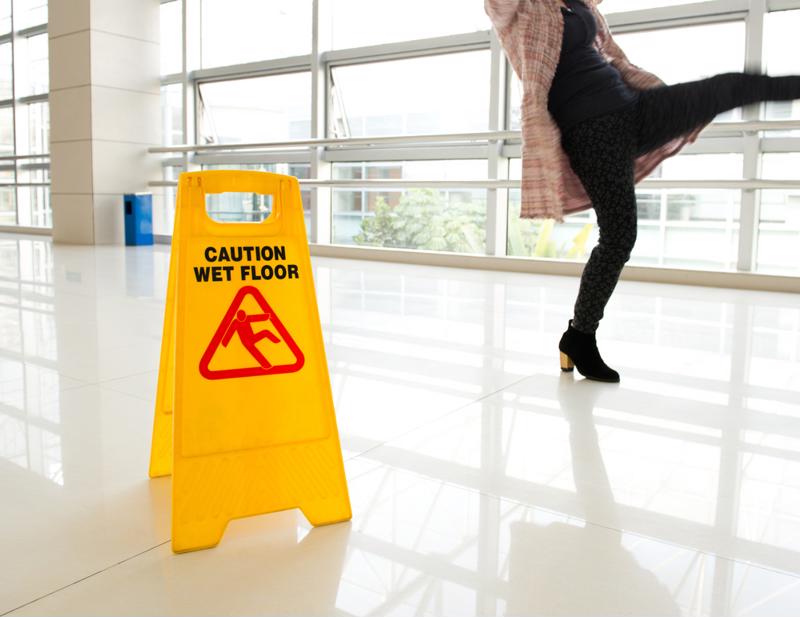Running a retail store requires a deft handle on the intricacies of not only operating a commercial enterprise, but also ensuring the safety of the general public. Due to the client-facing nature of the retail industry, lawsuits can unfortunately be quite prevalent. In addition to having to protect their companies against the constant threat of liability lawsuit from an injured shopper, retail store owners must also face allegations and claims from their own workers.
“A robust retail store umbrella insurance program can protect against multi-million dollar judgments.”
While a typical business liability plan will suffice to cover the losses stemming from a minor slip, trip or fall, a major accident can lead to losses that far exceed the limits of the basic coverage. As medical and legal costs continue to surge, brokers working with retailers should ensure these companies have a robust umbrella program that can cover a potential multi-million dollar judgment.
Slipping and sliding
Going shopping isn’t typically a dangerous endeavor. However, a tiny spill on a floor or a little leak from a freezer in a grocery store could ultimately lead to the dreaded slip and fall. Worse, in an odd paradox, the busier and more crowded a retail store becomes, the greater its chances of an employee missing a wet spot on the floor and a customer slipping in the puddle.
Not only do retail stores face lawsuits from clients who allege injuries caused by slipping on a wet floor, but employees who fall and hurt themselves also pose a risk. Although typically the subject of Workers Compensation insurance and not umbrella insurance, good practice applies to both customers and employees. In addition to wet floors and simply clumsiness, unloading delivery trucks, moving around inventory and stocking shelves are all just a regular day at work for many employees at retail stores. These all create an environment ripe with risks for employees.
Workplace slips, trips and falls are the second highest cause of injuries leading to lost work in general industry and the third most common in the wholesale and retail trade, according to the Centers for Disease Control and Prevention.
STFs can lead to a variety of minor and major serious injuries, including:
- Back injuries
- Sprains
- Strains
- Contusions
- Fractures
- Severe head injuries
- Paralysis
- Death
With proper attention to the causes of STFs, retail managers and owners can potentially reduce their exposure these risks, thereby ensuring safety of their employees and customers. Further, with less chances of a shopper or worker slipping and falling in a retail store, these companies face less of a chance of facing a lawsuit or claim for injuries or other damages.
 A wet floor can lead to a serious injury for both workers and customers in a retail space.
A wet floor can lead to a serious injury for both workers and customers in a retail space.Proactive prevention measures
Brokers and agents working with retailers should take the time to communicate to their clients ways to mitigate exposure to these risks. If successful over a long period of time, these retailers could potentially see their insurance premiums go down. According to All Law, retail stores have a legal responsibility to keep all customers and employees safe from injury.
Some of the major causes of slips, falls and trips can largely be controlled. By taking proactive measures, retail owners and managers can decrease the chance of an employee or customer suffering an injury at the store.
Monitor the floors
Retail store managers should already be making the rounds, checking on employees and inventory levels, and keeping an eye out for possible thieves. Monitoring the floor to ensure it’s free of any spills should also be an essential part of these duties. Whether it’s ice, snow or rain creating puddles at the entrance, loose mats and rugs or a spilled liquid in a random spot, it’s imperative a visible sign is posted and the wet spot gets cleaned immediately.
Brighten the space
A poorly lit store impairs the vision of shoppers and employees, leading to trips and falls. Adding more light can brighten up the store and reduce the risk of someone tumbling over. This includes changing overhead lights that might be too dim or about to burn out. With better lighting sources, retail stores can reduce the chances of shoppers slipping and falling in areas that are not illuminated enough.
Maintain a steady pace
Customers can be a demanding bunch, and employees often rush through their work to meet the exacting standards customers expect. However, by speeding through their duties, these workers increase the chances of causing an injury. Maintaining a steady and even pace during work ensures employees pay attention to the tasks at hand.
Keep an eye in the sky
Unfortunately, not everyone is completely honest and not every slip, trip or fall will be legitimate. It is not unheard of for customers to fake a fall after seeing a wet floor sign in the hopes of filing and winning a lawsuit. Indeed, even employees will pretend to trip and fall so they can sue their boss. Installing cameras throughout the store can provide the necessary evidence to discern between an actual accident and a obvious scam.
Who can help?
Brokers who partner with McGowan Excess and Casualty gain access to our specially tailored umbrella and excess liability products for retail stores. Since we can provide in-house underwriting, rating and policy issuance, we offer competitive premiums and broad coverages. Retail Store owners can protect their business for $10 million in limits or more by having their agents and brokers work with McGowan Excess & Casualty.



